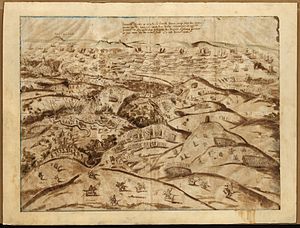Battle of Alcântara (1580)
| Battle of Alcântara | |||||||
|---|---|---|---|---|---|---|---|
| Part of the War of the Portuguese Succession | |||||||
 Engraving of the Battle of Alcântara (1580). |
|||||||
|
|||||||
| Belligerents | |||||||
|
|
|
||||||
| Commanders and leaders | |||||||
|
|
|
||||||
| Strength | |||||||
| 8,000 infantry 500 cavalry 30 guns |
13,000 infantry 1,800 cavalry 22 guns |
||||||
| Casualties and losses | |||||||
| 4,000 dead or captured | 500 dead or wounded | ||||||
The Battle of Alcântara took place on 25 August 1580, near the brook of Alcântara, in the vicinity of Lisbon, Portugal, and was a decisive victory of the Spanish Habsburg King Philip II over the Portuguese pretender to the Portuguese throne, Dom António, Prior of Crato.
In Portugal, the death of King Sebastian of Portugal in 1578, with only an elderly childless great uncle to succeed him, plunged the country into a succession crisis. King Philip II of Spain was one of seven who laid claim to the Portuguese throne, and in June 1580 a Spanish army of about 40,000 men (about half of which were German and Italian mercenaries) invaded Portugal, under the command of Don Fernando Álvarez de Toledo, Duke of Alba.
Two years earlier, the Portuguese army had been decimated at the Battle of Ksar El Kebir (1578), causing the death and imprisonment of tens of thousands of Portuguese soldiers and nobles. Dom António also lacked support from what was left of the Portuguese nobility and high clergy, which chose to support Philip II instead. Dom António was therefore forced to recruit an irregular army composed mainly of local peasants and townspeople as well as 3,000 African slaves who fought for António in exchange for their freedom.
The Duke of Alba met little resistance and in July landed his forces at Cascais, west of Lisbon. By mid-August, the Duke was only 10 kilometers from the city. West of the small brook Alcântara, the Spanish encountered a Portuguese force on the eastern side of it, commanded by António, Prior of Crato (a grandson of King Manuel I of Portugal who had proclaimed himself King as António I) and his lieutenant Francisco de Portugal, 3rd Count of Vimioso.
...
Wikipedia
